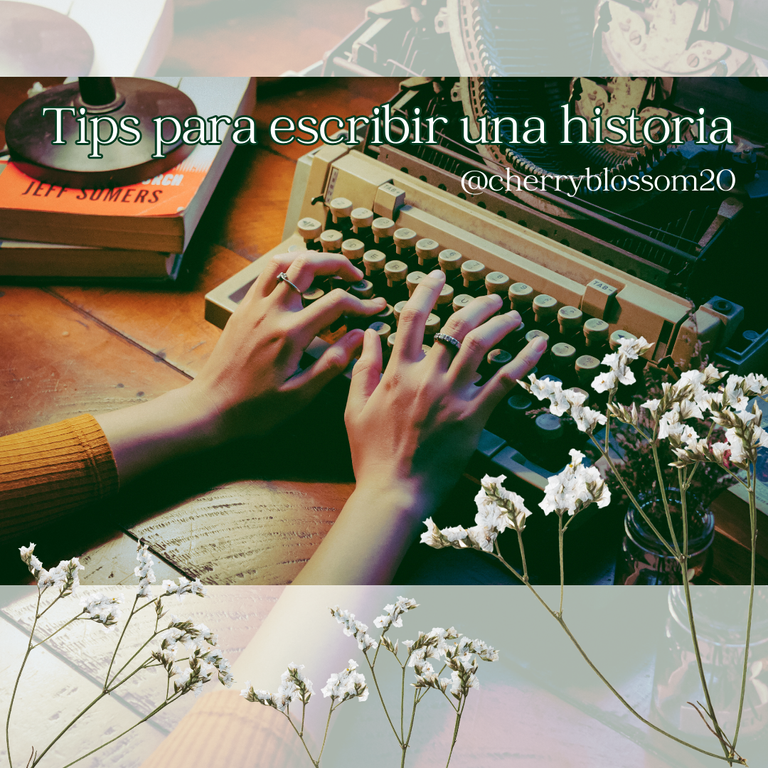
ENGLISH
Hello everyone! Today I want to share with you five ways to get you started in the exciting task of writing stories. As someone who enjoys reading and is also in the process of entering the world of creative writing, I have compiled several tips that I am excited to share with the community, especially for those who wish to project, like me, that movie with material to be a story that has been roaming the machinery of our minds for some time, but for some reason has not found a way to move from the mist of our own ramblings to reality. With a willingness to learn and the discipline to employ creativity, there is a good chance that we, newcomers to this ancient art and craft of storytelling, will find ways to enrich them, overcoming even our fear of writing a bad story. After all, what's the worst that can happen if we write a bad story after trying?
ESPAÑOL
¡Hola a todos! Hoy quiero compartir con ustedes cinco formas de iniciarte en la apasionante tarea de escribir historias. Como alguien que disfruta de la lectura y además se encuentra en el proceso de adentrarse al mundo de la escritura creativa, he recopilado varios consejos que me emociona compartir en la comunidad, especialmente para aquellos que deseen proyectar; al igual que yo, aquella película con material para ser historia que lleva tiempo rondando la maquinaria de nuestra mente, pero que por alguna razón no ha encontrado forma de trasladarse desde la bruma de nuestras propias divagaciones a la realidad. Con disposición para aprender y disciplina para emplear la creatividad, existe una buena oportunidad para que nosotros, debutantes en este antiguo arte y oficio de narrar historias, encontremos formas de enriquecerlas, superando incluso nuestro miedo a escribir una mala historia. Después de todo, ¿Qué es lo peor que puede pasar si escribimos una mala historia después de intentarlo?

These are literary tips and resources to help you develop your storytelling skills, so let's dive into the world of storytelling!
Estos son consejos y recursos literarios que te ayudarán a desarrollar tus habilidades narrativas. ¡Vamos a sumergirnos en el mundo de la creación de cuentos!
- Find your inspiration: Inspiration can come from anywhere: a dream, a conversation, a landscape, a memory. Keep your eyes and ears open, and always carry a notebook with you to jot down ideas. You can also explore literature and the stories of other authors to find inspiration. A good example of this is the famous writer Ray Bradbury, who said: "Read widely and you will write clearly. Read intensely and you will write boldly".
- Create memorable characters: Characters are the heart of any story. Spend time developing interesting and realistic characters. Ask yourself who they are, what they want, what obstacles they face. You can find helpful tips in the book "Anatomy of a Character" by John Truby, who explores how to create compelling, three-dimensional characters.
- Master story structure: Structure is key to maintaining coherence and interest in your story. Learn about the essential elements of story, such as introduction, conflict, climax, and resolution. A helpful resource is David Lodge's The Art of Fiction, which explores narrative structure and offers practical advice.
Encuentra tu inspiración: La inspiración puede provenir de cualquier lugar: un sueño, una conversación, un paisaje, un recuerdo. Mantén tus ojos y oídos abiertos, y lleva siempre contigo un cuaderno para anotar ideas. También puedes explorar la literatura y los cuentos de otros autores para encontrar inspiración. Un buen ejemplo de esto es el famoso escritor Ray Bradbury, quien decía: "Lee de forma extensa y escribirás con claridad. Lee intensamente y escribirás audazmente".
Crea personajes memorables: Los personajes son el corazón de cualquier cuento. Dedica tiempo a desarrollar personajes interesantes y realistas. Pregúntate quiénes son, qué desean, qué obstáculos enfrentan. Puedes encontrar consejos útiles en el libro "Anatomía del personaje" de John Truby, quien explora cómo crear personajes tridimensionales y convincentes.
Domina la estructura del cuento: La estructura es clave para mantener la coherencia y el interés en tu historia. Aprende sobre los elementos esenciales del cuento, como la introducción, el conflicto, el clímax y la resolución. Un recurso útil es el libro "El arte de la ficción" de David Lodge, que explora la estructura narrativa y ofrece consejos prácticos.
Utiliza recursos literarios: Los recursos literarios agregan belleza y profundidad a tus cuentos. Experimenta con metáforas, simbolismo, personificación y otras técnicas. Una fuente de inspiración es el libro "Palabra por palabra" de Anne Lamott, quien ofrece consejos sobre el uso efectivo de la descripción y el lenguaje en la escritura creativa.
Edición y revisión: La escritura es un proceso iterativo. No tengas miedo de revisar y editar tu trabajo. Elimina las partes innecesarias, mejora la estructura y pulsa el lenguaje. Puedes encontrar valiosos consejos sobre edición en "El elemento del estilo" de William Strunk Jr. y E.B. White, un clásico de la escritura en inglés.
Use literary devices: Literary devices add beauty and depth to your stories. Experiment with metaphors, symbolism, personification and other techniques. One source of inspiration is the book "Word for Word" by Anne Lamott, who offers advice on the effective use of description and language in creative writing.
Editing and revising: Writing is an iterative process. Don't be afraid to revise and edit your work. Eliminate unnecessary parts, improve structure, and polish language. You can find valuable editing tips in "The Element of Style" by William Strunk Jr. and E.B. White, an English writing classic.
Recuerda que la práctica constante es fundamental para mejorar tus habilidades de escritura. Dedica tiempo a escribir regularmente y busca oportunidades para recibir retroalimentación constructiva, ya sea de otros escritores o a través de talleres de escritura.
En conclusión, escribir cuentos es una experiencia creativa gratificante. Sigue estos consejos, aprovecha los recursos literarios y experimenta con tu imaginación. Como dijo el gran escritor Stephen King: "Si quieres ser escritor, debes hacer dos cosas por encima de todas las demás: leer mucho y escribir mucho".
Espero que estos consejos te inspiren y te impulsen a comenzar tu viaje en la escritura de cuentos. ¡No dudes en compartir tus historias con el mundo y disfruta del proceso creativo!
Remember that constant practice is critical to improving your writing skills. Spend time writing regularly and look for opportunities to receive constructive feedback, either from other writers or through writing workshops.
In conclusion, writing short stories is a rewarding creative experience. Follow these tips, take advantage of literary resources and experiment with your imagination. As the great writer Stephen King said, "If you want to be a writer, you must do two things above all others: read a lot and write a lot."
I hope these tips inspire and propel you to begin your story writing journey. Feel free to share your stories with the world and enjoy the creative process!



Gracias ppor todas las sugerencias @cherryblossom20